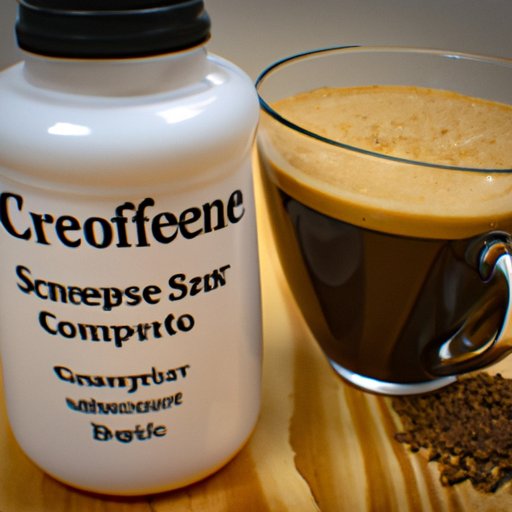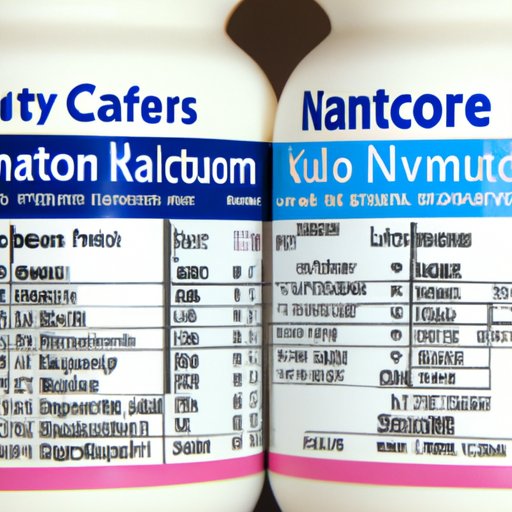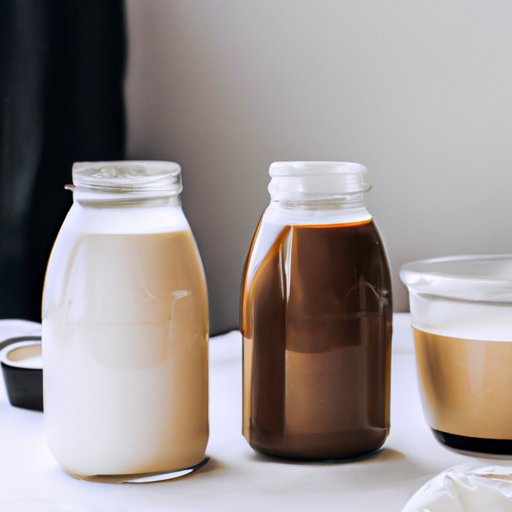Introduction
Coffee creamers are a popular way to add flavor, texture, and sweetness to your morning cup of java. But many store-bought products are filled with unhealthy ingredients, like artificial sweeteners, hydrogenated oils, and preservatives. What is a healthy coffee creamer, and how can you make sure your creamer choice is as good for you as it is tasty? In this article, we’ll explore the benefits of healthier coffee creamers, natural alternatives, and how to find the best low-sugar options on the market.

Exploring the Benefits of Healthy Coffee Creamers
When shopping for a healthy coffee creamer, look for products made with healthier ingredients. This means avoiding hydrogenated oils, artificial flavors and colors, and high fructose corn syrup. Instead, choose creamers that use natural sweeteners like honey, maple syrup, or agave nectar. Also look for creamers made with real dairy, such as full-fat milk or cream, or non-dairy milks like coconut, almond, soy, or oat. These are all better options than creamers made with skim milk or powdered creamer.
Healthy coffee creamers also have lower calorie and sugar content. The amount of sugar in a creamer can vary widely, so it’s important to read the nutrition labels to get an accurate picture. Generally, creamers with natural sweeteners have less sugar than those made with artificial sweeteners. Additionally, some creamers are sweetened with stevia, which has no calories and is a natural alternative to sugar.
Finally, healthy creamers often have more natural flavorings. Many store-bought creamers rely heavily on artificial flavors, but there are plenty of options with natural, delicious flavors like hazelnut, vanilla, and caramel. Look for creamers that use natural extracts and spices instead of artificial flavors.
Creating a Healthier Coffee Experience with Natural Alternatives
If you’re looking to make your coffee experience even healthier, there are some natural alternatives you can try. Coconut milk, almond milk, soy milk, and oat milk are all dairy-free and plant-based options that can be used as creamers. They all have their own unique flavor and nutritional profile, so it’s worth experimenting to find the one that’s right for you.
Coconut milk is a creamy, tropical-tasting option that’s low in calories and contains beneficial fatty acids. Almond milk is a great source of vitamin E and is naturally sweet. Soy milk is a good source of protein and fiber, while oat milk is a heart-healthy option that’s high in fiber and vitamins.
A Guide to Dairy-Free and Plant-Based Creamers
Dairy-free and plant-based creamers offer a wide range of flavors and health benefits. When choosing a creamer, it’s important to consider the nutritional information, including calories, fat content, and additional nutrients. Here’s a quick guide to the pros and cons of each option:
- Coconut Milk: Pros – Low in calories, rich source of beneficial fatty acids; Cons – Can be high in saturated fat.
- Almond Milk: Pros – Good source of vitamin E, naturally sweet; Cons – Not a good source of protein.
- Soy Milk: Pros – Good source of protein and fiber; Cons – Contains phytoestrogens, which can affect hormone levels.
- Oat Milk: Pros – High in fiber and vitamins; Cons – Can contain added sugar.

Comparing the Nutrition Facts of Popular Creamers
It’s also helpful to compare the nutrition facts of different creamers. Most creamers have similar amounts of calories, but there can be significant differences in sugar content, fat content, and other nutrients. For instance, regular creamers tend to have more fat than non-dairy alternatives, and some creamers contain added sugar. It’s important to read the labels carefully to make sure you’re getting the healthiest option.
Understanding the Ingredients in Non-Dairy Creamers
Non-dairy creamers often contain a variety of additives, such as thickeners, emulsifiers, and stabilizers. These are used to give the creamer a creamy texture and help it mix more easily into your coffee. Some common additives include carrageenan, guar gum, and xanthan gum.
Artificial sweeteners are also commonly found in non-dairy creamers. These include sucralose, aspartame, and saccharin. While these sweeteners have no calories, they may have negative health effects, such as increased risk of cancer and digestive issues. Be sure to check the label for any artificial sweeteners before purchasing a creamer.
Finally, many creamers contain preservatives to help extend their shelf life. These can include benzoates, sorbates, and propionates, which can be harmful if consumed in large amounts. If you’re concerned about preservatives, look for creamers that are labeled “preservative-free.”
Finding the Best Low-Sugar Coffee Creamers
If you’re trying to cut down on sugar, there are a few things you can do to find the best low-sugar coffee creamer. First, look for creamers that are labeled “no added sugar” or “unsweetened.” These will typically have less sugar than regular creamers.
Second, read the labels carefully. Many creamers contain hidden sugars in the form of syrups or sweeteners. Check the nutrition labels to get an accurate picture of the sugar content. Finally, look for creamers that use natural sweeteners like honey, maple syrup, or agave nectar, as these will have less sugar than artificial sweeteners.
Conclusion
Coffee creamers can be a delicious and convenient way to customize your morning brew. But not all creamers are created equal. To make sure you’re getting a healthy creamer, look for products made with healthier ingredients, lower calorie and sugar content, and more natural flavorings. You can also try natural alternatives like coconut milk, almond milk, soy milk, and oat milk, or opt for dairy-free and plant-based creamers. And if you’re looking for a low-sugar option, read labels carefully and look for creamers with natural sweeteners like honey, maple syrup, and agave nectar.
By understanding what makes a coffee creamer healthy, you can make smarter choices and enjoy a healthier coffee experience. With the right creamer, you can add flavor and sweetness without compromising your health.
(Note: Is this article not meeting your expectations? Do you have knowledge or insights to share? Unlock new opportunities and expand your reach by joining our authors team. Click Registration to join us and share your expertise with our readers.)
